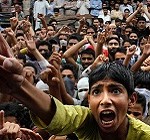Since the hanging of Jaish-e-Mohammed militant Afzal Guru for his involvement in the 2001 Parliament attack case, on February 9, 2013, the security situation in Jammu & Kashmir has remained in flux. Guru, who came from the apple-producing town of Sopore in north Kashmir’s Baramulla district, was hailed by the separatists as an icon of Kashmiris’ struggle for their ‘right to self determination,’ which they believe has been granted to them by various United Nations’ resolutions.
The Separatist camp, led by the octogenarian leader Syed Ali Shah Geelani, who heads the hardliner faction of the Hurriyat Conference, has been instigating Kashmiris to impose shutdowns and demand the return of Guru’s body to his family. While the initial public anger against Guru’s execution has waned, the separatists are persisting in their agitations. But the response to these repeated strike calls is waning among the locals who are anxious about the impact on their livelihood. Expectations of another booming summer tourist season and the economic benefits that will accrue from it are propelling people to now ignore the strike calls and resume their normal lives.
Politically, the declining reaction to the agitations is a direct function of the local population’s yearning for normalcy. But the sense of alienation among ordinary Kashmiris remains and analysts point out that Guru’s hanging may have further exacerbated those feelings. Chief Minister Omar Abdullah, at the risk of being called anti-Indian, has repeatedly pointed out at various public platforms, the necessity to address this issue. Pakistan, too has sought to keep the unrest alive by offering moral, diplomatic and political support to Kashmiris. These efforts have not yielded much success, as the divided Hurriyat leadership is unsure of how to proceed in the on-going agitations. The Hurriyat was hoping to encash on Guru’s execution, but the moribund response to their protest politics has put them in a quandary, and is another indication of its declining support base. This augurs well for India.
Security wise, however the situation remains worrisome for the state. A sustained campaign of violence unleashed by the militants – since mid-2012 – against the democratically elected Panchayat representatives in the Valley, has left the latter demoralized. In the absence of any concrete measure from the central and the state governments towards their empowerment, many of these Panchs and Sarpanchs have quit their jobs. Additionally, the persistent attacks which target the security forces – as evident in the recent fidayeen attack at Bemina on the outskirts of the Srinagar city – portend that militants will not budge from their violent goals.
Economically, the continuous period of unrest, is leading to major economic losses for the state. According to an estimate by the Kashmir Economic Alliance, the body of local traders and business houses in the Valley, there is a loss of Rs. 4500 crores since February 9, the day Guru was hanged. There is also accompanying anger against the disruption of economic activity, though it has not surfaced in open. The state is now limping back to normal economically, though the after-effects continue to ripple.
In this backdrop, the response from the Government of India to address the grievances of the state has been dithering. The focus has largely been on minor tactical issues, not the larger strategic picture which requires a major push on the security and economic front. Omar Abdullah’s repeated demand for the revocation of the Armed Forces (Special Powers) Act (AFSPA) is being stonewalled by the central government, as have allegations of human rights violations against the security forces. Major infrastructure projects – such as the Kashmir railway project, the upgrading of power infrastructure – continue to remain unimplemented, adding to local woes.
Change can come, but with the help of the private sector. According to the official statistics in 2012, almost 1.3 million tourists including 37,000 foreigners visited the Kashmir Valley and another record tourist season is about to begin. Corporate India can utilize a ready pool of graduate English-speaking local talent in the service sector industries (like hospitality, call centers, transport). A skill-enhancing initiative by industry for training local youth, will also give them the required wherewithal and confidence to enter the job market. Many of these programmes exist, but have been implemented half-heartedly by the government, with dismal outcomes. A sustained effort by the corporate sector will act as an excellent confidence-building measure and can possibly reverse the pro-secession rhetoric of the separatists.
Sameer Patil is Fellow, National Security Studies and Director, Center for International Security, Gateway House.
This blog was exclusively written for Gateway House: Indian Council on Global Relations. You can read more exclusive content here.
For interview requests with the author, or for permission to republish, please contact outreach@gatewayhouse.
© Copyright 2013 Gateway House: Indian Council on Global Relations. All rights reserved. Any unauthorized copying or reproduction is strictly prohibited


